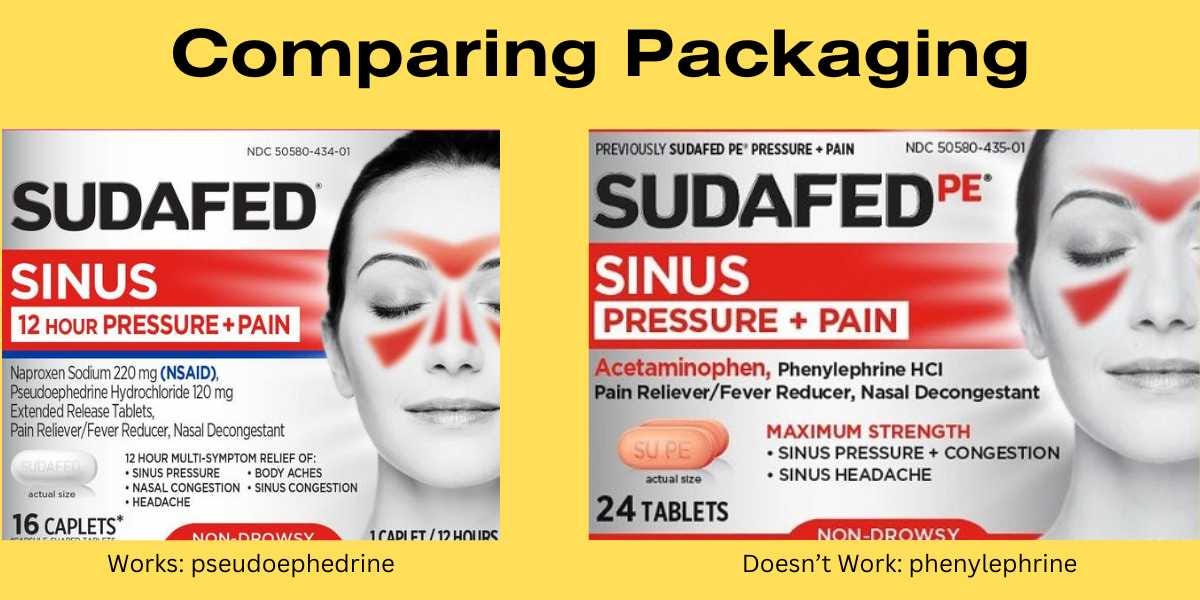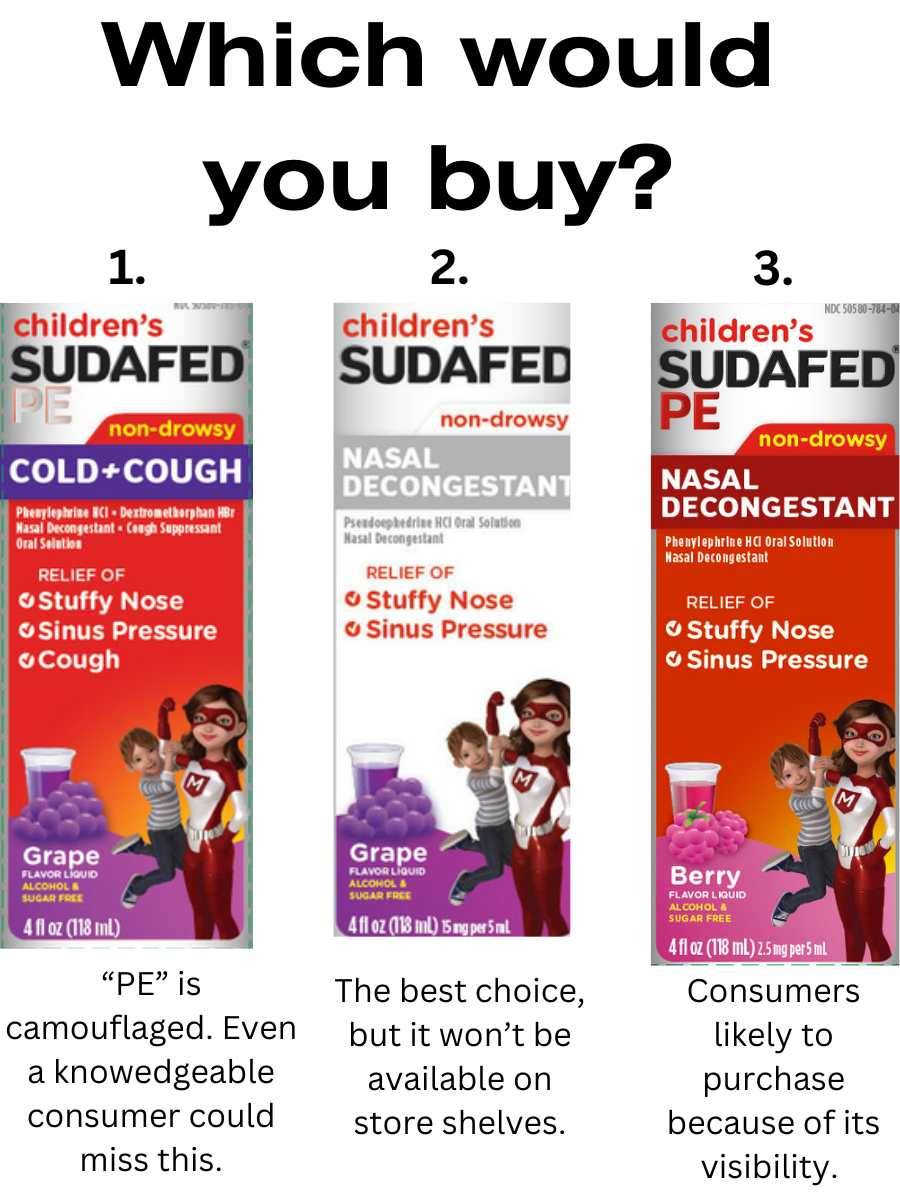September 17, 2023: Placebo decongestant outrage; new blood cancer drug; Ibrance label change; poisonous ingredient in supplement; eye drops warning; lisinopril side effect; food as medicine
Common OTC ingredient in cold medicine deemed no better than placebo
Did you learn by trial and error over recent years that many over-the-counter cold medicines don't work to relieve a stuffy nose? Or perhaps, with a multi-ingredient product like Nyquil or Dayquil, there were enough other symptoms relieved (such as aches and cough), that the congestion wasn't as noticeable. No doubt some consumers think they are buying "Sudafed" instead of "Sudafed PE." Even if they see the "PE," many don't realize that those two letters meant that it is an entirely different medication than regular Sudafed. See the confusing product images below.
Finally, a Food & Drug Administration (FDA) advisory committee has confirmed what some health professionals have known for awhile and what many consumers have had to figure out for themselves. Last week, the Non-prescription Drug Advisory Committee unanimously concluded that oral phenylephrine, a decongestant ingredient found in hundreds of over-the-counter cold and flu pills and syrups, does not work as a nasal decongestant.
The FDA will now have to decide whether to remove oral phenylephrine from its list of approved ingredients for over-the-counter use. They plan to first seek public opinion on the matter. The FDA’s announcement clarified that it is safe to consume drugs with phenylephrine and that other ingredients (like ibuprofen or acetaminophen) will still work as intended in multi-ingredient products.
FDA Statement: https://www.fda.gov/drugs/drug-safety-and-availability/fda-clarifies-results-recent-advisory-committee-meeting-oral-phenylephrine
Many consumers are outraged, and class action lawsuits have already been filed against Procter & Gamble (maker of Nyquil), Walgreens (generics) , and Johnson & Johnson's (Sudafed) for false advertising and deception. On the other hand, the industry trade association for OTC drugs (Consumer Healthcare Products Association) disagrees with the committee's findings and says that previous clinical evidence is inappropriately being dismissed and discounted.
Northeastern University Pharmacy School professor Mansoor Amijihe provided some answers to questions about phenylephrine:
Why doesn't phenylephrine work? Amijihe says that the approved 5 or 10 mg in oral doses is not effective by the time it's metabolized – very little of the medication ends up reaching the nose. But if you take it as a spray, you do get a decongestant effect.
Why didn’t the manufacturers increase the strength of the drug? Research has found that if phenylephrine is taken orally at higher doses, it causes blood pressure to soar.
What over-the-counter medications work to relieve decongestion? In addition to some nasal sprays, drugs that contain pseudoephedrine work. Unfortunately, to get it, you will have to deal with some inconveniences, like standing in line at the pharmacy counter, showing ID, and putting your name and address in a nationwide database called MethCheck or NPLEx. Pseudoephedrine (contained in products like Sudafed, generic pseudoephedrine, Claritin-D, and Zyrtec D) have been kept behind pharmacy counters since 2006, when a law was enacted to stop it from being processed into illegal methamphetamine or "crystal meth." The DEA has limits on how many grams of pseudoephedrine a person can purchase each month.
https://news.northeastern.edu/2023/09/13/decongestant-sudafed-dont-work/
Consumers should make sure they carefully read OTC labels. Here’s another example of how confusing packaging can be:
New Drug Approvals and Safety Announcements
The FDA approved BiolineRx's injectable drug Aphexda (motixafortide) for use in combination with the drug filgrastim for treatment in patients with multiple myeloma, a type of blood cancer. The combined drugs help facilitate Autologous stem cell transplantation (ASCT), which is part of the standard of care treatment paradigm for multiple myeloma. BiolinRx is an Israeli company that completed clinical trials in partnership with Washington University School of Medicine in St. Louis, Missouri.
https://www.curetoday.com/view/fda-approves-aphexda-plus-filgrastim-for-patients-with-multiple-myeloma
Breast cancer drug Ibrance (PALBOCICLIB) had a drug safety label update to warn of skin and subcutaneous tissue disorders, including hand-foot syndrome (Palmar-plantar erythrodysesthesia syndrome). MD Anderson website explains that a handful of chemotherapy drugs cause this side effect, especially capecitabine (Xeloda brand name), and that hand-foot syndrome is different than hand-foot-mouth disease, which is caused by a virus. It tends to appear within 2-3 months of treatment.
MD Anderson information on hand-foot syndrome: https://www.mdanderson.org/cancerwise/chemotherapy-side-effect--hand-foot-syndrome.h00-159459267.html
Drug Safety Labeling Change: https://www.accessdata.fda.gov/scripts/cder/safetylabelingchanges/index.cfm?event=searchdetail.page&DrugNameID=934
Patient reviews for Xeloda (capecitabine ) at Ask a Patient website
Eye Drops Warning Letters
Similasan, Natural Opthalmics, CVS Health, OcluMed, Walgreens, Boiron, and DR Vitamins Solutions received warning letters from the FDA that their eye drops products are falsely and illegally labeled as treatments for pink eye, cataracts, glaucoma, conjunctivitis and more. The FDA said some of the eye products are labeled to contain silver and long-term use can cause skin and body tissues, including the eye, to permanently turn gray or blue-gray. The companies have 15 days to respond to the FDA's warning letter as it continues its investigation. Check here for a full list of products to avoid.
https://www.usatoday.com/story/money/2023/09/12/fda-warning-unapproved-eye-products/70836516007/
Online Weight Loss Supplements Warning
The FDA issued an advisory about certain weight loss dietary supplements that may contain highly toxic yellow oleander, a poisonous plant native to Mexico and Central America. Labeled as Nuez de la India, and potentially marketed as “botanical food,” “India Nuts for Weight Loss,” “slimming seeds,” “India seeds for weight loss,” or “diet seeds,” if the product contains the yellow oleander, it can cause severe neurologic, gastrointestinal and cardiovascular effects or even death. Symptoms may include nausea, vomiting, dizziness, diarrhea, abdominal pain, cardiac changes, dysrhythmia, and more.
One person in the state of Maryland is known to have been hospitalized after consuming Nut Diet Max brand Nuez de la India seeds.
These products are typically sold online through third-party platforms (e.g., Amazon, Walmart, eBay)
The CDC states that testing of products by Flora Research Labs and purchased by the New Jersey Poison Information and Education System online during December 2022 revealed that nine of the ten products labeled as tejocote actually contained yellow oleander.
The brands Nut Diet Max and Todorganic Natural Products have been voluntarily recalled. But the FDA warned that other candlenut supplements are still available “with similar marketing descriptions may also contain yellow oleander.” The FDA advises consumers to be cautious about purchasing supplements and for those who have taken any of the products of concern to contact their health care provider immediately.
https://www.nbcnews.com/health/health-news/weight-loss-supplements-contain-hidden-poisonous-ingredient-rcna105032

Delayed Swelling Side Effects from Popular Blood Pressure Drug Lisinopril
Lisinopril, the most commonly taken blood pressure medication in the U.S., can cause a life threatening side effect called angioedema (swelling of the lower layer of skin and tissue). It is life threatening because when the throat swells up suddenly, it can block a person's ability to breathe. As People's Pharmacy radio host and pharmacist Joe Graedon explains, the swelling can also occur in the abdomen, making it less likely to be diagnosed. What's even more perplexing is that the side effect can be delayed by many years.
In "A Delayed Lisinopril and Angioedema Reaction Surprises Pharmacist," a pharmacist patient writes to Joe that after 12 years of taking Lisinopril, he suddenly experienced face swelling to the point he couldn't talk and had to go to the E.R., where he was put in the ICU and sucessfully treated with steroid medication administered intravenously.
https://www.peoplespharmacy.com/articles/lisinopril-and-angioedema-a-life-threatening-side-effect
Patient experiences reported on the AskaPatient web site also provide examples of swelling that can happen in the legs and feet in addition to the face, abdomen, head and neck when taking lisinopril:
Patients taking Lisinopril and experiencing swelling
Patients taking Prinivil (lisinopril) and experiencing swelling
Patients taking Zestril (lisinopril) and experiencing swelling
Patients taking Lisinopril and hydrochlorothiazide and experiencing swelling
Food as Medicine Tips: Nutrition and Diet for Hypothyroidism
Check out this 4.5 minute video on nutrition and diet for hypothyroidism presented by MedShadow Foundation’s registered dietician and nutritionist, Alison Acerrae. In this episode from the "Food as Medicine" video series, Alison provides five healthy eating tips that can help prevent or alleviate symptoms for patients who have been diagnosed with hypothyroidism.
https://medshadow.org/videos/nutrition-for-hypothyroidism-thyroid-disease-foods-and-diet-food-as-medicine-series/
Visit us as AskaPatient.com for drug ratings and reviews provided by patients along with more news and health information. Note to readers: Ask a Patient® Health News (general edition) will be sent on Tuesday, September 19. If you are not already subscribed, sign up today.



